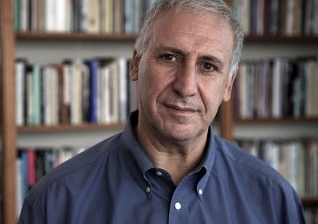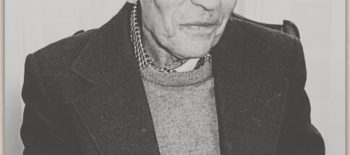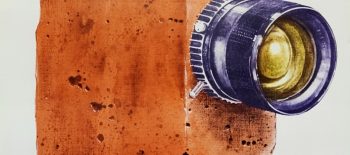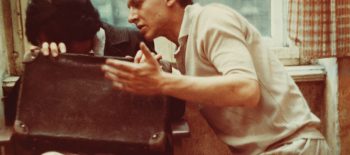Polish Poetry Unites is a new video series for anyone interested in literature, history and reading. In each episode Edward Hirsch, a distinguished American poet, and the president of the Guggenheim Memorial Foundation, will introduce a celebrated Polish poet to American audiences.
Krzysztof Kamil Baczyński, one of the most important Polish Poets of the 20th century, is not widely known in the USA, as he is very difficult to translate. Regretfully, says Edward Hirsch. Baczyński and his wife joined the Warsaw Uprising in 1944. They got separated. He was killed on the 3rd day of the uprising in the center of Warsaw, and his wife Barbara was killed 3 weeks later just a few days after discovering that she was pregnant. She probably never learned that her husband had died, and Krzysztof never learned that Barbara was expecting. The three of them are together now, buried in the same grave at the Powązki Cemetery in Warsaw.
“Their love was a great love,” says Hirsch.
Footage of places connected with Baczyński’s life in Warsaw is seen as Hirsch talks about the Polish poet: the building where he was born, the school he went to, the marker at the spot where he died, shot by a German sniper, and the family grave which is frequently visited by school children.
Baczyński was only 23 when he died, but left behind his prose and many poems, drawings and paintings, as he was also a talented artist.
In the short documentary film, which follows Edward Hirsch’s introduction, an engineer, Anna Kurkowska-Mielczarek is featured, talking about her life in the context of Baczynski’s poem—“A Poet’s House”—a fragment of his poetic novellas called The Poet’s Wedding. For her, the poem symbolizes the ideal atmosphere for a home, one that doesn’t translate into material things. She feels like she grew up in such an atmosphere in the house of her parents. Feelings from the past are often hard to describe, yet often can be found in poetry, which is what happened to Anna Kurkowska-Mielczarek.
A Poet’s House (a fragment from The Poet’s Wedding)
translated by Zuza Glowacka
The house is bright, built of light,
An air bubble trapped
in a lunar fishermen net
with radiant walls of plants,
and the lake like roof
where through reflected stars,
the future shows,
that look like music or a rose.
Krzysztof Kamil Baczyński was born on the 21st of January 1921 in Warsaw as the son of a teacher Stefania and the famous interwar literary critic Stefan Baczyński. Baczyński started writing poems as a teenager. In high school, he belonged to the secret radical socialist group Spartakus as well as to the scouting movement. In his short novels and poems, Baczyński demonstrated both romantic traditions and catastrophism. His writings depict the brutality of war and suggest that love is the only force that can effectively defend a human being against it. His first known poem was entitled Accident at work (1936). When WWII broke out in September 1939 following the German aggression on Poland, Baczyński had to hide his Jewish origin’s in the midst of the witch hunt organised by the Wehrmacht across the country. In addition, it is worth mentioning that his socialist sympathies weakened following the Soviet Union’s aggression on the September 17, 1939 and eventually cooled off after the discovery in April 1943 of the graves in Katyń. In June 1942, Krzysztof Kamil Baczyński married a student of underground Polish studies, Barbara Drapczyńska. The latter would die just a few weeks after her husband. In the summer of 1944, he participated as a volunteer in the Warsaw Uprising under the nickname “Jan Bugaj.” He was shot on August 4, by a German sniper. Krzysztof Kamil Baczyński and his wife Barbara are both buried at the Military Cemetery in Warsaw’s Powązki cemetery.
Biography source: Sebastien Meuwissen for BritishPoles.UK
More about Krzysztof Kamil Baczyński
More about Krzysztof Kamil Baczyński in English:
Krzysztof Kamil Baczyński: A Lyrical Diary
Krzysztof Kamil Baczyński – a catastrophist full of faith
Poet of Flaming Warsaw
The Passion of Krzysztof Kamil Baczyński
Moderator: Edward Hirsch
Director: Ewa Zadrzyńska
Cinematography: Jacek Mierosławski
Editor: Anna Jędrzejewska
Executive Producer: Bartek Remisko

Edward Hirsch is an American poet and critic who wrote a national bestseller about reading poetry entitled How to Read A Poem And Fall In Love With Poetry published in 2014. He has published nine books of poems, including The Living Fire: New and Selected Poems (2010) and Gabriel: A Poem (2014), a book-length elegy for his son that The New Yorker called “a masterpiece of sorrow.” He has also published five prose books about poetry. His latest book of essays, 100 Poems to Break your Heart was published in 2021. He is president of the Guggenheim Memorial Foundation in New York City. Currently he is finishing a book of essays called The Heart of American Poetry. It will be published in April to mark the fortieth anniversary of the Library of America. The book consists of deeply personal readings of forty essential American poems. It rethinks the American tradition in poetry. Ed Hirsch lives in New York City.
Lead image: Krzysztof Kamil Baczyński, reproduction by: Andrzej Szypowski / East News. Image source: Culture.pl



